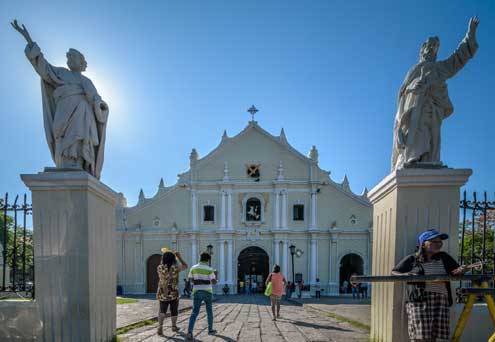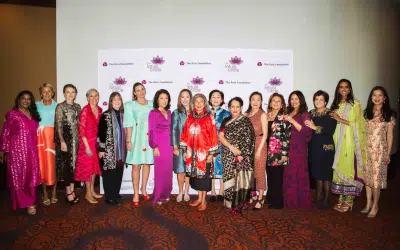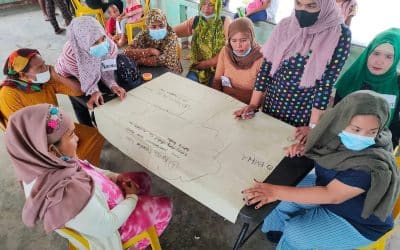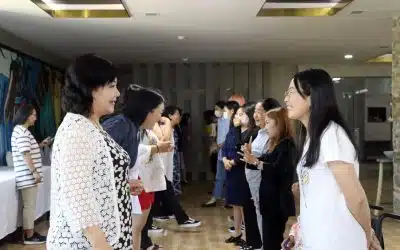InAsia
Insights and Analysis
The Politics of Religion in the Philippines
February 24, 2016
Thirty years ago, on Feb. 22, 1986, then Jaime Cardinal Sin made an urgent call on church-owned Radio Veritas for Filipinos to take to the streets and support the revolt against President Ferdinand E. Marcos. For most Filipinos, Jaime Cardinal Sin’s message was what started the People Power Revolution, with hundreds of thousands of supporters forming a human barricade between Camp Crame and Camp Aguinaldo (thereby protecting the “rebels” – former President Fidel Ramos and Senator Juan Ponce Enrile). It was a show of force and a moment of truth for a nation that wanted freedom from the 20-year Marcos dictatorship. Had people not responded to the Cardinal’s call, Philippine history might have been very different. As candidates vie for endorsements ahead of May 9 general elections, here’s a look back at the role organized churches have had in Philippine politics, and a look ahead at how this might play out in these elections.

Historically, organized churches have been involved in electoral politics in the Philippines, including in the selection of candidates and church members who have run in elections themselves. Photo/Flickr user Wayne S. Grazio
The notion of a “politics of religion” refers to the increasing role that religion plays in the politics of the contemporary world and the consequences that a politics of religion has on inclusive nation-building, democracy, and human rights. The involvement of religious groups in Philippine politics is not new. During the Spanish colonial era, the “indio priests” advocated for the “secularization” of the Catholic church to allow “native priests” to head parishes. At that time, it was an act of treason that demanded the death penalty, for only “Filipinos” (i.e., Spaniards born in the Philippines) were deemed to have the capacity to govern and thus native priests could not serve as parish priests. The 1872 mutiny which resulted in the death of the three priests, Gomez, Burgos, and Zamora, became the “seed” of the Philippine Revolution, inspiring the Filipino heroes Rizal and Bonifacio to “imagine a Filipino nation” and lead a revolution against Spain to achieve it.
Fast forward to the Marcos years, and discussions on Vatican II, liberation theology, the student uprisings in the 1960s and 1970s, community organizing, and the impact of Martial Law figured in the various discussions among the different religious congregations, including the Redemptorist Community and the Jesuit Mission. Vatican II saw the Catholic Church’s reawakening of the zeal to embark in new pastoral initiatives such as serving the poor and the marginalized, and to solicit the contributions of the laity in pastoral care. The human rights violations under President Marcos and the increase in the number of “desaparecidos” (victims of human rights abuses who have disappeared) resulted in the collective anger and frustrations that exploded into the People Power movement. According to the Center for Media Freedom and Responsibility, from July 1973 to October 1984 there were at least 22 military raids on church establishments, four of them on institutions of the Protestant Church. Seminaries, Catholic schools, and other facilities were ransacked or closed. Priests, nuns, and laypersons were detained.
While the People Power movement led to the downfall of President Marcos, the Catholic Church has remained a powerful opposing force on issues such as the Reproductive Health Bill and divorce. President Aquino signed the Reproductive Health Bill in December 2012, but it wasn’t until 2014 that the Supreme Court declared it constitutional. The Divorce Bill is still caught up in a contentious battle (the Philippines is the only country in the world, aside from Vatican City, that lacks divorce laws.)
Historically, organized churches have been involved in electoral politics in the Philippines, including in the selection of candidates and church members who have run in elections themselves. For instance, the Iglesia ni Cristo (Church of Christ), with a tradition of bloc voting required from its 1 million voting members, has allegedly supported presidential candidates throughout history: President Marcos in 1986, Eduardo Cojuangco in 1992, Joseph Estrada in 1998, Gloria Macapagal-Arroyo in 2004, and Manny Villar in 2010. The Jesus is Lord movement ran campaigns themselves (Bro. Eddie Villanueva in the 2004 Presidential elections, where he won 3% of the votes), and most recently, the Pilipino Movement for Transformational Leadership (PMTL), a community composed of Catholics, Protestants, and Born Again groups, bonded together to elect “God-centered servants.” For the May 2016 elections, the PMTL claims it can muster up to 10 million voters out of the 54.6 million Filipinos registered to vote.
The Catholic Church, though not endorsing political candidates, exhorts the voters to vote “according to one’s conscience.” In the launch of the “One Good Vote” campaign against bribery and vote buying, Luis Antonio Cardinal Tagle recalled the casting of ballots during the papal conclave, and exhorted voters to pray and have a formulation based on one’s religion.
Just how potent are the political endorsements of religious groups? In the case of Iglesia ni Cristo, whose members are required to vote as a bloc, previous endorsements have failed: Eduardo Cojuangco came in 3rd, Estrada was ousted in 2001 because of corruption charges, Macapagal-Arroyo had graft charges and is under hospital arrest, and Manny Villar lost the elections. And yet, despite the failed endorsements, candidates still trooped to the INC compound to get the “blessing” (and votes) of its executive minister. A million votes can certainly swing the tide in a hotly-contested election.
Judging by the recent events that involved the INC, its endorsement of a presidential candidate might not auger well for either the church or for its endorsed candidate. The 101-year-old Church faces its worst crisis in years – former ministers are accusing top leaders of corruption and illegal detention of members who dare question the INC. In July, it expelled the sibling and mother of its executive minister, Eduardo Manalo, for “sowing disunity” in the Church. It also had a previous minister, Menorca, arrested for alleged illegal possession of a hand grenade. In August, it organized a protest rally against the Department of Justice’s supposed meddling into its internal affairs but drew flak instead from netizens and the general public who were stranded or suffered long commutes because protesters rendered EDSA impassable. Even statements from presidential candidates Grace Poe and Jejomar Binay that INC members were “just protecting their faith” were criticized for defending a church that is demanding special privileges and immunity from criminal charges.
Most recently, Senatorial candidate Manny Pacquiao lost the endorsement of Nike (and some voters as well) when he erred in making a slur against the LGBT community. Invoking Bible verses in his defense, he failed to realize that a prejudicial remark from any political candidate will not sit well with any group that still faces discrimination. But then again, his bigoted remark could work both ways: he will clearly lose the votes of the LGBT community and human rights advocates, but perhaps he will earn the votes of some ultra-conservatives.
So, 75 days to the May presidential and local elections, candidates will literally move heaven and earth to get the nod of voters. For some of them, the fastest route may be through organized churches.
Maribel Buenaobra is The Asia Foundation’s deputy country representative in the Philippines. She can be reached at [email protected]. The views and opinions expressed here are those of the author and not those of The Asia Foundation or its funders.
4 Comments
About our blog, InAsia
InAsia is posted and distributed every other Wednesday evening, Pacific Time. If you have any questions, please send an email to [email protected].
Contact
For questions about InAsia, or for our cross-post and re-use policy, please send an email to [email protected].The Asia Foundation
465 California St., 9th Floor
San Francisco, CA 94104
The Latest Across Asia
News
April 25, 2024
Program Snapshot
April 18, 2024
News
April 17, 2024

2024 Lotus Leadership Awards
The Lotus Leadership Awards recognize contributions towards gender equality in Asia and the Pacific







You are undoubtedly part of PNoy’s Yellow Media! You inadvertently reported that the Iglesia Ni Cristo supported Manny Villar in the 2010 Presidential elections where (the very recent) history is very much aware that in reconciliation the INC voted for the ungrateful Aquino. Your motive shows that you want to portray that the INC vote no longer exists! You will be frustrated as we are more united than ever thanks to your persecution! See you in May 9, 2016!
Furthermore, if it were not for the support of the INC in PNoy’s bid for the presidency in 2010, he would not have won. Especially if the INC opted to support again former President Erap since PNoy won the election with only a margin of 100,000. It was clear that majority still wanted Erap instead of PNoy!
Edwin Delacruz: Thank you for pointing out the factual error in the piece; the Iglesia ni Cristo did endorse Aquino in 1010.
Thanks for sharing your thoughts about people power anniversary.
Regards